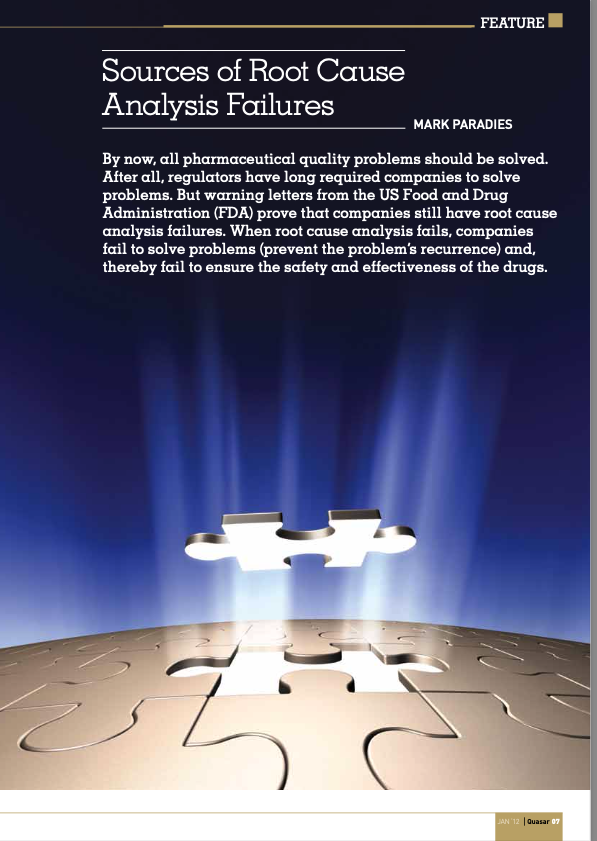Interested in Improving Root Cause Analysis? This Paper is for You…

Sources of Root Cause Analysis Failures
I wrote this paper for the British Association of Research Quality Assurance (BARQA) Journal Quasar, and they were nice enough to let me republish it here. The sources of root cause analysis failure are described to help you improve root cause analysis.
Click on the link below to download the three page paper.
Mark Paradies’ paper published in Quasar
The paper provides four examples of the FDA citing root cause analysis issues in warning letters. It explains four categories of reasons that pharmaceutical root cause analysis efforts fall short and get pharma manufacturers in trouble with the FDA.
The paper is written for people interested in improving root cause analysis to improve pharmaceutical quality. Still, the problems discussed are common to all industries worldwide and apply to those looking to improve safety, operation, maintenance, process safety, patient safety, and quality by improving root cause analysis.
Learn the Fundamentals to Improve Root Cause Analysis
The article above doesn’t have the room to explain how to improve root cause analysis and avoid the sources of root cause analysis failure. But we have covered that in our article on the fundamentals of root cause analysis which is available HERE.
To learn more about advanced root cause analysis, I suggest attending one of our courses. More information about our training is available HERE.
Would you like to discuss your initiatives to improve your company’s root cause analysis? We would be happy to discuss your plans and how we might help. Contact one of our implementation advisors by calling 865-539-2139 or text us by CLICKING HERE.

Sources of Root Cause Analysis Failures by Mark Paradies was published by Quasar (Members Magazine of BARQA, British Association of Research Quality Assurance) No. 118 Pages 7 – 10, Jan 2012. Used by Permission.

Made the paper available in 2022 because the lessons still apply a decade later! Let’s pass this article along so that these issues won’t still be causing problems in 2032.
Learn Even More at the 2023 Summit

If you would like to learn even more about improving your CAPA Program and continuous improvement efforts, attend the CAPA & Continuous Improvement Best Practices Track at the 2023 Global TapRooT® Summit being held at the Margaritaville Lake Resort, Lake Conroe, near Houston, Texas, on April 24-28, 2023.

The sessions in the CAPA & Continuous Improvement Best Practices Track include:
Session 1 – Using TapRooT® to Improve CAPA at Thermo Fisher Scientific | Jonathan Goerke
Session 2 – Three Skills to Take Your Investigations to the Next Level | Barb Carr
Session 3 – FDA Presentation | Speaker to be announced
Session 4 – Ideas for Improving CAPA Sharing Best Practices | Benna Hughes
Session 5 – Best Practices for TapRooT® Implementation | Mark Paradies
Session 6 – TapRooT® Users’ Success Stories | Jason Dalen & Vincent Vincek, Facilitator – Ken Reed
Session 7 – Roadmap to Success | Rick Hulse
Session 8 – How to Use TapRooT® for Minor and Major Accidents & Proactive Improvement | Marcus Miller
Session 9 – How Admiral Rickover Built the First High-Reliability Organization | Mark Paradies
Connect with the track leader, Benna Hughes, on LinkedIn to learn more about this track.
Also, learn about the inspiring Keynote Speakers presenting at the Summit.

And the pre-Summit Courses.
We look forward to seeing you there!




